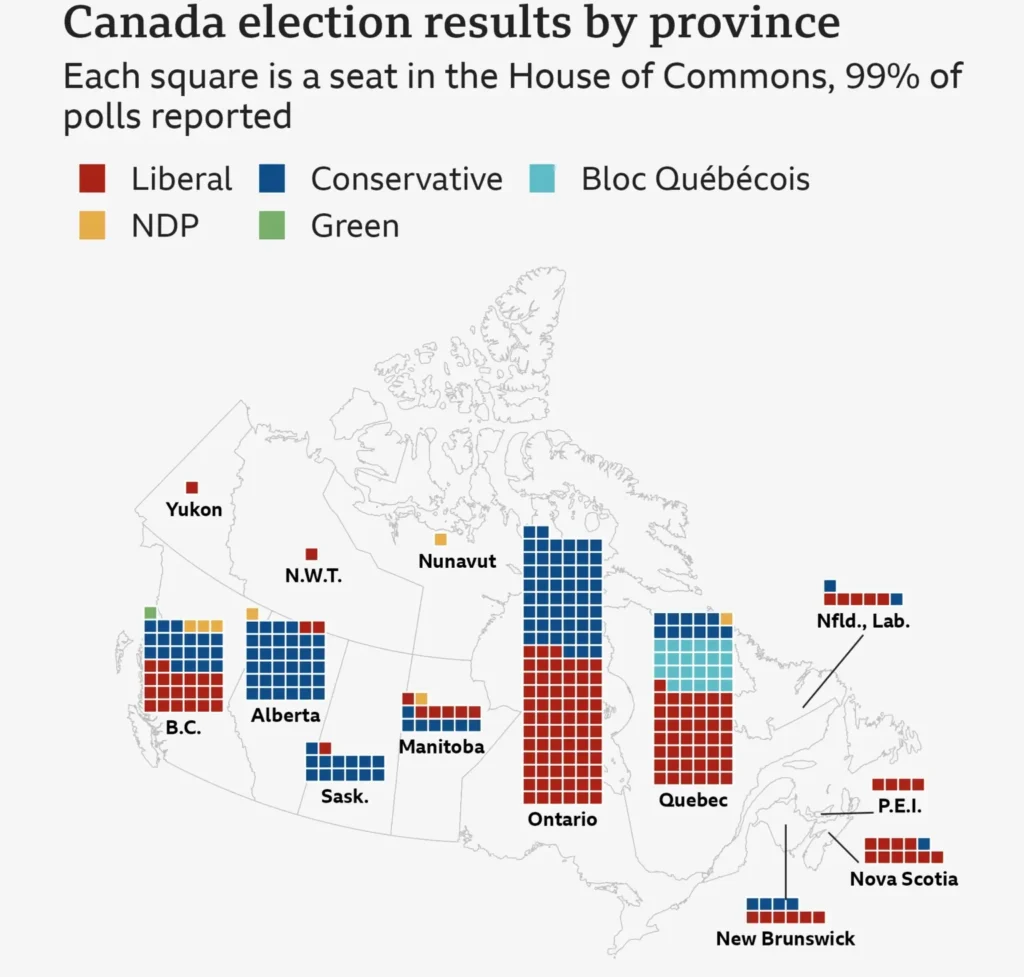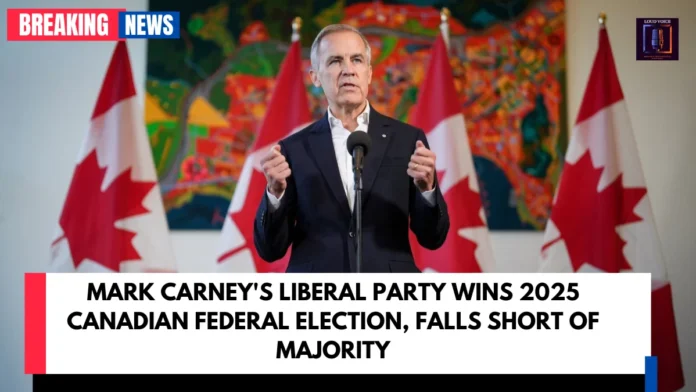Key Takeaways
- Mark Carney’s Liberal Party Wins 2025 Canadian Federal Election: The Liberals secured 167 seats, just shy of the 172 needed for a majority in the 343-seat House of Commons.
- Conservative leader Pierre Poilievre lost his own seat in Carleton, Ontario, marking a significant personal defeat.
- NDP leader Jagmeet Singh also lost his seat and announced his resignation as party leader.
- The election was heavily influenced by aggressive foreign trade policies and annexation threats, which galvanized Canadian nationalist sentiment.
- Voter turnout increased, with over 7 million Canadians casting ballots in advance polls, setting a new record.
A Political Upset: Liberals Secure Minority Government
In a surprising turn of events, Mark Carney’s Liberal Party emerged victorious in Canada’s 2025 federal election, securing 167 seats in the House of Commons. While this result falls short of the 172-seat majority threshold, it marks a strong comeback for the Liberals after months of trailing in public opinion polls.
Carney, who became leader of the Liberal Party earlier this year following the resignation of former Prime Minister Justin Trudeau, campaigned on themes of national unity and economic resilience. His message resonated strongly with voters concerned about international instability, particularly in light of mounting external threats to Canadian sovereignty and trade security.
Conservative Leader Poilievre’s Defeat
Conservative leader Pierre Poilievre experienced a dramatic personal loss in the election, failing to retain his seat in the Carleton riding. The defeat was emblematic of the broader struggles faced by the Conservative Party, which managed to secure only 144 seats nationwide despite strong early momentum.
Poilievre’s campaign focused on economic reforms and reducing government spending but failed to counter the growing national sentiment that prioritized unity and international autonomy. In his concession speech, he acknowledged the electorate’s decision and committed to playing a constructive role in the opposition.
NDP’s Decline and Singh’s Resignation
The New Democratic Party saw a significant decline in support, securing just seven seats and losing official party status. Jagmeet Singh, the party leader, lost his seat in Burnaby Central and promptly announced his resignation. Singh’s leadership had drawn criticism for lacking clarity on foreign policy and domestic unity, contributing to the NDP’s sharp downturn.
His departure is expected to open the door for a generational leadership change within the NDP and could ease diplomatic tensions with nations concerned about his past affiliations and public positions.
Impact of Global Politics on the Election
The 2025 election took place against the backdrop of escalating geopolitical tensions, with international leaders adopting increasingly aggressive rhetoric on trade and territorial claims. These external threats played a major role in shaping Canadian voter sentiment, triggering a strong push for national sovereignty and diversified international partnerships.
Carney capitalized on this mood, presenting a vision of Canada as resilient, independent, and globally assertive. He vowed to prioritize the country’s interests in trade, security, and diplomacy while reducing overdependence on traditional alliances.

Voter Turnout and Electoral System
Voter engagement reached a high point in the 2025 election, with more than two-thirds of registered voters casting ballots—an increase over the previous election cycles. Advance voting broke records, with over 7 million Canadians participating before election day.
Canada’s first-past-the-post electoral system meant that despite high voter engagement, seat distribution did not proportionally reflect the popular vote. This has reignited calls for electoral reform, though such changes remain politically contentious.
Looking Ahead
With a minority government in place, Carney’s Liberals will need to navigate a fragmented parliament. Coalitions and strategic alliances will be essential to pass major legislation. The new government faces significant challenges, including rising inflation, strained international relations, and the need for major infrastructure and economic investments.
Carney has outlined a vision centered on unity, economic transformation, and foreign policy recalibration. How effectively this minority government can execute its agenda remains to be seen, but early signals suggest a pragmatic and proactive approach to governance.
Conclusion
The 2025 Canadian federal election has ushered in a new political chapter for the nation. In the face of growing global uncertainty, Mark Carney’s appointment as prime minister represents a shift toward cautious leadership. The defeats of key opposition figures and the Liberal Party’s return to power—albeit in a minority—highlight a broader desire for steadiness, strategic foresight, and national integrity. In the months ahead, Canada’s political path will be shaped by its ability to adapt, unify, and respond to both domestic and global challenges.


